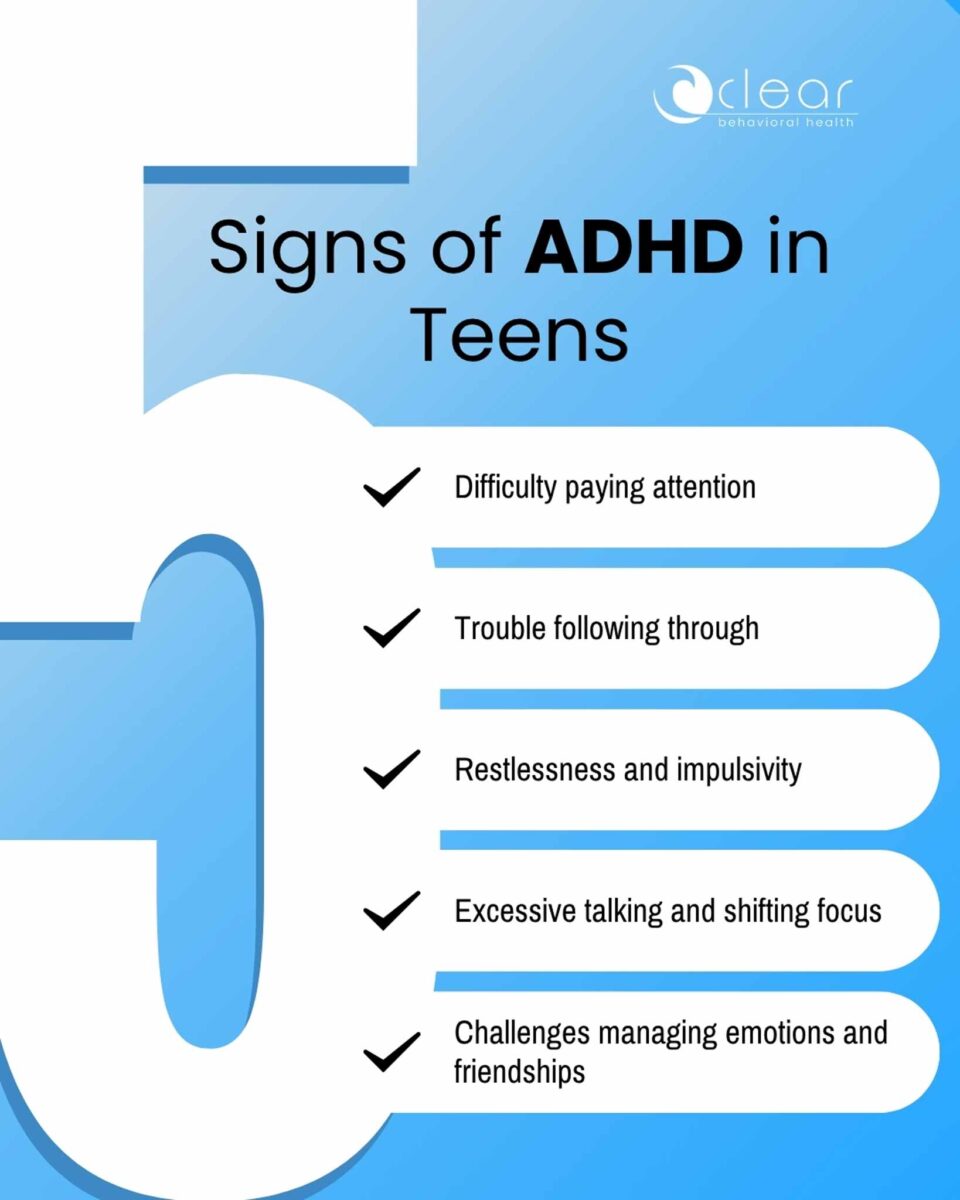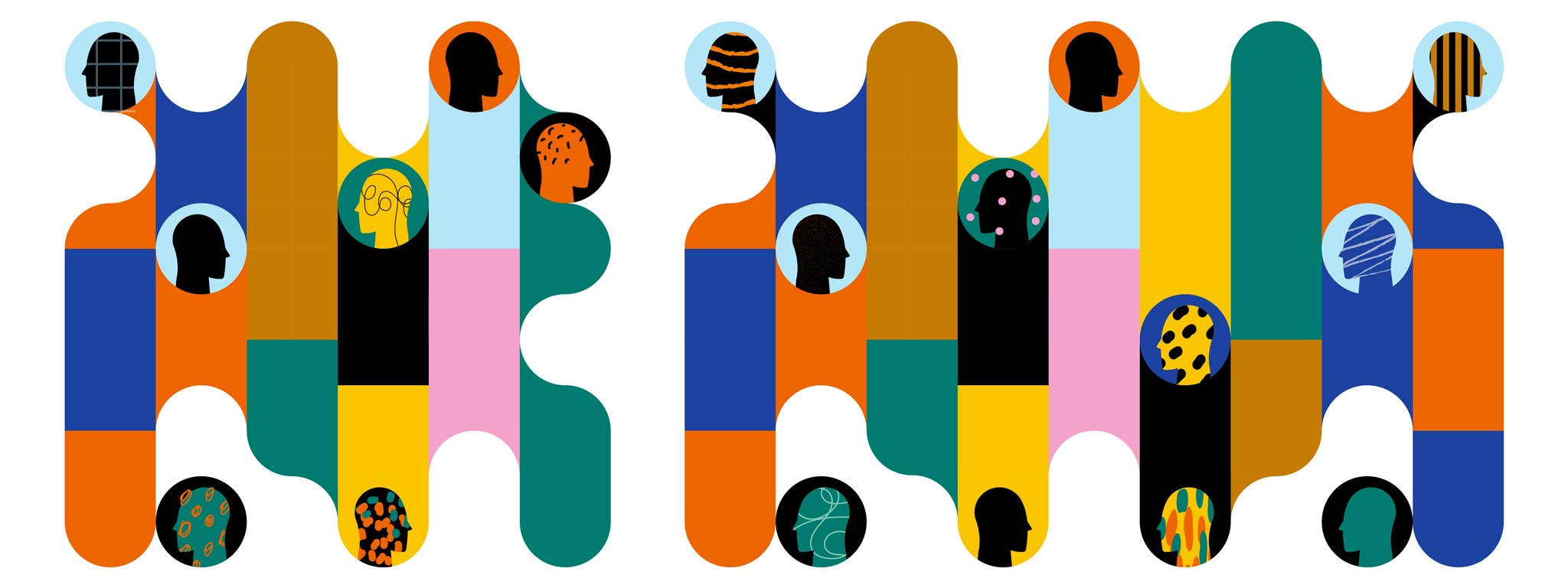Parenting a teenager is never simple, and if your teen is struggling with attention, impulsivity, or motivation, you might be wondering if there’s something deeper going on. ADHD looks different in teens than it does in younger children, and recognizing it early can make all the difference in helping your teen thrive.
Understanding what ADHD is, what the signs look like in teenagers, how untreated ADHD can impact your teen’s life, and what the best treatment options are can lead to a healthier and happier young adult life. If your teen is struggling, Clear Behavioral Health offers compassionate, evidence-based ADHD treatment for teens throughout the Los Angeles, CA area, including our location in El Monte, CA.
What is ADHD (attention-deficit hyperactivity disorder)?
Attention-Deficit/Hyperactivity Disorder (ADHD) is a neurodevelopmental condition that affects attention, organization, and impulse control. According to the National Institute of Mental Health (NIMH), ADHD is one of the most common mental disorders diagnosed in children and adolescents and can persist into adulthood [1].
While all teens can seem distracted or moody from time to time, ADHD symptoms are ongoing and disruptive to daily life. Teens can experience difficulties at school, at home, and in relationships.
Related: What is ADHD?
Help your teen regain focus with our trusted ADHD treatment programs today
What are the signs of ADHD in a teenager?
ADHD symptoms can show up in teens as patterns of inattention and/or hyperactivity-impulsivity that get in the way of daily functioning or development [2]. Recognizing these patterns can help parents understand the signs and know when to seek professional help.
Inattentive signs
Your teen may seem distracted, unfocused, or disorganized, and it’s not because they don’t care, but because sustaining attention is genuinely difficult for them. They might exhibit a wide range of inattentive signs, including:
- Trouble paying attention in class or following conversations
- Losing track of homework or school supplies
- Struggle to follow directions that involve multiple steps
- Forget to turn in assignments or finish tasks they started
- Avoid activities that require long periods of focus [3]
Hyperactive and impulsive ADHD symptoms
Teens with hyperactive or impulsive symptoms may appear restless or constantly on the go. You might notice your teen:
- Interrupts others or blurts out answers
- Has difficulty waiting in line or sitting still
- Acts quickly without thinking. This can sometimes lead to risky behaviors
- Talks excessively or shifts topics abruptly
- Fidgets often or feels driven by an internal motor [1,3]
Emotional and social signs
ADHD affects more than just attention; it can also impact mood and relationships. Teens with ADHD often:
- Get frustrated or irritated easily
- Struggle with self-esteem from repeated criticism
- Have difficulty maintaining friendships or social skills
- Withdraw after feeling misunderstood or overwhelmed [3]
If these challenges sound familiar, an ADHD diagnosis from a qualified mental health professional or an adolescent psychiatry specialist could be beneficial [4].

What does undiagnosed ADHD look like in teenagers?
When ADHD in teens goes unrecognized, it can influence nearly every area of their lives. It is not uncommon for teens with ADHD to experience declining grades, low confidence, or damaged relationships.
Academic challenges
Teens with undiagnosed ADHD often encounter difficulties performing well despite being intelligent. They might start homework late, forget due dates, or lose focus mid-task. Over time, this leads to stress, frustration, and a sense of failure [1,2].
Emotional impact
Without understanding why things feel so hard, many teens begin to believe they’re lazy or incapable. This can contribute to low self-esteem, stress, and even mood disorders like depression or anxiety [4].
Behavioral and social difficulties
Difficulty regulating impulses and emotions can lead to risky behaviors, conflicts with peers, or experimenting with substances. This combination can raise the risk of developing substance use disorders later in life. Due to lower levels of impulse control, teens with ADHD are more likely to misuse substances as a form of self-medication, especially if ADHD is undiagnosed or untreated [5].
Teens with untreated ADHD may also struggle with co-occurring mental disorders such as bipolar disorder, conduct disorder, or autism spectrum disorder, complicating diagnosis and care [1,4].
Related: The Effects of Untreated ADHD
How does ADHD affect teens?
ADHD can influence nearly every part of a teen’s world. Understanding these effects can help you support your teen with empathy and structure.
1. Learning and school performance
ADHD can make it difficult to start or finish assignments, stay focused during classes, and perform well in long-term projects. Many teens experience disorganization and forgetfulness, which can feel discouraging for both them and their teachers [2].
Related: Treatment for Teen School Issues
2. Emotional regulation
Teens with ADHD often experience challenges managing emotions. This can look like feeling easily frustrated, impatient, or overwhelmed. This difficulty regulating emotion, or “emotional dysregulation,” is one of the core symptoms recognized by mental health professionals [4].
3. Relationships and social skills
ADHD often affects communication and social skills. Teens might interrupt, lose track of conversations, or misread cues, which can lead to isolation or social rejection [3].
4. Co-occurring conditions
Research shows that ADHD frequently co-occurs with other mental health challenges like sleep disorders, anxiety, and depression [4]. Addressing these overlapping symptoms helps create a more complete and effective treatment plan.
What is the best treatment for ADHD in teens?
The most effective treatment for teens with ADHD is comprehensive and tailored to the unique needs of every teen. A combination of therapy, family involvement, skills coaching, and medication when appropriate provides the best long-term outcomes [1,4].
Behavioral and cognitive-behavioral therapy (CBT)
CBT helps teens understand how ADHD affects their thoughts and behaviors while teaching practical tools for organization, emotional regulation, and problem-solving [4].
Parent and family support for teens with adhd
Parents play a key role in teen mental health treatment. Our clinicians teach families communication strategies, consistent routines, and reward systems that foster positive behavior and structure at home [1].
Related: Should I Engage With Parent Counseling If My Teenager Is In Treatment?
Academic and social skill building
Treatment often focuses on improving executive functioning. Think daily skills like planning, prioritizing, and managing time. These skills can help your teen succeed academically and socially [4].
Medication management
Some teens benefit from medication to reduce ADHD symptoms, improve focus, and control impulsivity. If medication is recommended for your teen, some common options include:
- Stimulants: methylphenidate (Ritalin) and amphetamine-based medications (Adderall, Vyvanse)
- Non-stimulants: atomoxetine (Strattera), guanfacine, or clonidine [3,4]
Medication management can be a valuable addition to ADHD treatment and should always be overseen by a qualified mental health professional. Studies show that when prescribed and monitored appropriately, ADHD medications are not only safe and effective, but they may even reduce the risk of substance misuse later in life [5].
At Clear Behavioral Health, our partnership with Neuro Wellness Spa allows us to provide coordinated medication management as part of a holistic treatment plan.
Holistic and complementary health approaches
In addition to traditional therapy and medication, complementary health approaches like mindfulness, physical exercises for ADHD symptoms, proper sleep, and nutrition can support better focus and mood regulation. These should be integrated into an evidence-based plan guided by professionals [3,4].
Comprehensive ADHD treatment for teens
At Clear Behavioral Health, we specialize in helping teens with ADHD build confidence, focus, and emotional balance. Our teen mental health programs combine behavioral therapy, family collaboration, and holistic care so your teen can thrive, not just manage symptoms.
- Behavioral therapy and CBT to strengthen attention and coping skills
- Parent support to promote consistency at home
- Medication management through our partnership with Neuro Wellness Spa
- Holistic modalities such as mindfulness, art therapy, music therapy, and physical activity
- Academic support and tutoring to get teens back on track and improve performance
We provide ADHD treatment for teens across the Los Angeles area, including our convenient locations in El Monte, CA, Van Nuys, CA, and El Segundo, CA. Our compassionate team of mental health professionals helps families navigate the challenges of ADHD with understanding, expertise, and lasting results.
Transform your teen’s future and get connected with leading ADHD specialists today
Next steps if you suspect ADHD in your teen
If your teen has ADHD or you believe your teen might be showing signs of ADHD, taking action early can make a meaningful difference. Here are some steps to consider:
- Talk with teachers or school counselors, and ask whether they’ve noticed that your teen is distracted, impulsive, or not participating in the classroom. Teachers and school staff often see consistent patterns that can help guide next steps [2].
- Seek an evaluation with a mental health professional or adolescent psychiatry specialist (such as a psychologist, psychiatrist, or developmental pediatrician).
- Obtain a full assessment, including psychological testing, behavior rating scales, developmental history, and feedback from both parents and teachers [4].
- Develop a plan that includes therapy, school accommodations, and, if appropriate, medication management.
- Monitor progress regularly. Treatment for ADHD often requires adjustments as your teen grows and their needs evolve [1].
Clear Behavioral Health is here to help you take the first step. With understanding, structure, and care, your teen can thrive.
References:
- Attention-Deficit/Hyperactivity Disorder (ADHD). (n.d.). National Institute of Mental Health (NIMH). https://www.nimh.nih.gov/health/topics/attention-deficit-hyperactivity-disorder-adhd
- Data and statistics on ADHD. (2024, November 19). Attention-Deficit / Hyperactivity Disorder (ADHD). https://www.cdc.gov/adhd/data/index.html
- National Library of Medicine. (n.d.). Attention deficit hyperactivity disorder. ADHD | ADD | MedlinePlus. https://medlineplus.gov/attentiondeficithyperactivitydisorder.html
- Drechsler, R., Brem, S., Brandeis, D., Grünblatt, E., Berger, G., & Walitza, S. (2020). ADHD: current concepts and treatments in children and adolescents. Neuropediatrics, 51(05), 315–335. https://doi.org/10.1055/s-0040-1701658
- Frank, C. (2024, November 19). ADHD and substance abuse. Child Mind Institute. https://childmind.org/article/adhd-and-substance-abuse/
